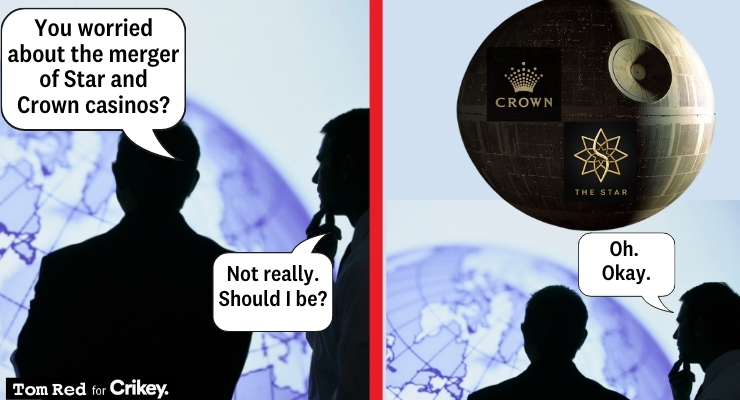
Star Entertainment’s proposal for a merger with Crown wouldn’t merely create a gambling giant controlling casinos in most capital cities, but a juggernaut of political influence.
Crown’s political influence in Victoria and Western Australia allowed it to evade effective regulatory scrutiny in those states, while its national influence ensured cooperation from the Department of Home Affairs. Star’s influence in Sydney was demonstrated in 2014-15 when the NSW Government structured its draconian lockout laws to protect Star’s Sydney casino.
A key component of Crown’s influence was its massive donations: over the last decade, it has handed about $1.2 million in donations to the WA and Victorian Labor and Liberal parties.
Star isn’t quite in Crown’s league, but it has also been extremely generous to political parties. It has given more than $220,000 in donations to federal Labor since 2015, and $270,000 to the NSW Liberal Party. It also represented, pre-pandemic, a substantial source of revenue for the NSW Government: Star’s Sydney casino by itself provided more than $240 million in government revenue in 2019.
Revenue has dropped substantially since then due to border closures and lockdowns but NSW was still budgeting for more than $300 million in combined revenue from Star and Crown — once its Sydney casino is allowed to commence operating — by 2024.
The merger would give the resulting entity control of all but two capital city casinos, and a corresponding importance in the revenue of Queensland, Victoria and Western Australia.
Like Crown, Star has a history of employing well-connected former political figures and staffers to manage its government relations and regulatory connections, both in NSW and in Queensland.
While the Australian Competition and Consumer Commission will focus on competition for gambling customers as the main area of competition law concern if any merger proceeds, the real impact of the merger will be outside the competition regulator’s remit: the power that a combined casino group would wield through its significance for state revenues, its political donations, and the political connections it can deploy to achieve regulatory outcomes.
Moreover, it can use a potent and underappreciated form of influence: politicians and bureaucrats know such a company would be able to offer an attractive job post-public life, either as a director or senior executive. There’s no regulator to investigate the implications for power and influence-peddling of major mergers.








A ‘pit boss’ at a Las Vegas casino, with whom I struck up an illuminating conversation over Black Jack, said to me “Richard, I see you haven’t yet learnt the first rule of gambling”, when I enquired what it was he said “Don’t, look around you, this place is built on the money of losers”. I was impressed with his insight and honesty, given he worked inside the beast.
We’ll, duh…
Should have been Well duh…
Dont allow the merger. Dont vote LNP.
As far as I am aware, there has never been a conviction for money-laundering through casinos in Australia. The casino regulators have turned a blind eye for decades.
Past and present Casino security chiefs could provide evidence if required to do so. Also the Ministers and CEO’s of Gaming Agencies would also be aware.
Aside from that international gambling via casinos is a closed shop. Look what happened to Packer when he tried to open up shop in Vegas! Ending the monopolies would therefore have no effect. Ending casino licences would be unacceptable to the corrupt political parties especially those whose belief is – give a go, get a go’
Interesting, while one used to read or hear of allegations targeting ‘Chinese’ apartment investors for ‘money laundering’, this was ignoring or deflecting from what occurs in suburban housing developments and real estate in general; another casino…..
We are all complicit in benefiting from the misery.
There’s quite enough hypocrisy around already thank you very much.
Surely this is backwards: a merger means that there’s only one casino business to deal with (or, ideally, nationalize) instead of two? Half the number of ex-politicians on the board, etc. Sydney already only has Star, so the merger would just mean they got another building, instead of so-called competition moving into town as well.
What competition angle can the ACCC possibly be barking after? Better odds for the roulette wheels?